RVing is all fun and freedom until you check your bank account after a week on the road. Between gas station burritos, campground fees, and that Bigfoot souvenir you had to have, the costs can sneak up on you!
But here’s the good news: saving money while RVing isn’t about giving up the good stuff. It’s about playing smarter, not tighter. From fuel hacks to scoring cheap campsites, these tips are battle-tested by real RVers who know how to pinch a penny.
Food & Groceries
Cook Your Meals and Prep Ahead
Cooking your own meals saves money fast, especially if you’re out for weeks or months. Prepping meals ahead of time can also make things easier. You can cook in batches at home, freeze them, and reheat on the road. This cuts down on grocery stops and restaurant spending. A multi-function cooker like an Instant Pot or a combo air fryer makes it easier to cook just about anything in a small space without heating up the rig or using a bunch of pots and pans.
Plan Meals Around Sales and Bulk Buys
Before hitting the road, look at grocery ads for places you’ll be stopping. Build your meal plan around what’s on sale. Big warehouse stores like Costco or Sam’s Club are good for buying meat, dry goods, and snacks in bulk (if you have a membership). Also, keep a digital folder of coupons or store apps on your phone. Every bit adds up, especially when you’re restocking for several weeks at a time.
Restock in Larger Towns and Buy Fresh Locally
You’ll usually find better prices at national discount chains in bigger towns. Use those stops to load up on staples. Then, when passing through smaller towns, pick up fresh items like fruit, veggies, or eggs from local markets or roadside stands. Local produce is often cheaper, and you’re supporting small growers while saving gas and time compared to hunting everything down at separate stores.
Use Commissaries and Exchanges if You Qualify
If you’re a veteran or active duty, you may have access to military commissaries and exchanges. These stores don’t charge sales tax, and many offer fuel at discounted rates too. That adds up quickly over a long trip. You’ll need proper ID, and hours can vary, but it’s worth checking access if you’re eligible.
Campground and Overnight Stays
Join RV Discount Clubs and Fuel Rewards Programs
Clubs like Good Sam, Passport America, Harvest Hosts, and Thousand Trails offer discounted campground rates, overnight stays, and access to unique locations like farms or wineries. Some have restrictions or blackout dates, so check the details before committing. Fuel rewards programs from chains like Pilot Flying J or Love’s can also shave off a few cents per gallon, which adds up over a long trip.
Check out our RV membership comparison to find the best option for you.
Buy National and State Park Passes
If you plan to visit multiple parks, annual passes can save money fast. The America the Beautiful pass covers entrance fees at over 2,000 federal sites, including national parks and monuments. It typically pays for itself in three to four visits. Many states also offer annual passes for their park systems, which can be a good deal if you’re staying in one region for a while.
Camp Free on Public Land
Boondocking on Bureau of Land Management (BLM) or National Forest land is free and legal in many parts of the country. Apps like Campendium, iOverlander, and FreeRoam can help you find these spots. These areas don’t have hookups, so you’ll need to be self-contained, but it’s one of the most budget-friendly ways to camp.
Tip: Boondocking for a few days between paid campground stays is a great way to stretch your travel budget.
Use Free Overnight Parking While Traveling
Some businesses allow overnight RV parking if you ask ahead and follow the rules. Walmart, Cracker Barrel, Cabela’s, and some rest areas often welcome RVs for a night. Don’t set up camp! Just park, rest, and move on. It’s a good option for overnight stops when you’re just passing through.
Book Weekly, Monthly, or Off-Season Rates
Campgrounds usually charge less per night if you stay longer. Weekly and monthly rates are often much lower than paying the nightly rate. Off-season stays can also be cheaper, especially in places with winter or summer slowdowns. Planning longer stays saves money and lets you relax without moving so often.
Travel During Shoulder Seasons
Spring and fall usually have fewer people on the road and lower campground rates. These months often bring mild weather too, depending on the region. Traveling outside of peak season helps you avoid crowds and save money at the same time.
Split Costs by Camping with Friends
If you’re traveling with others, consider sharing a larger site. Some campgrounds and boondocking spots allow two rigs per site, typically called “companion” sites, and you can split the cost. You can also share groceries, cook together, and split firewood. Group camping brings the per-person cost down while making things more social.
Workamp or Volunteer for Free Sites
Some campgrounds and public lands offer free campsites in exchange for a few hours of work each week. Tasks might include cleaning, greeting guests, or light maintenance. You usually get a full-hookup site in return. It’s a good way to stretch your budget while staying in one place for a while.
Travel & Fuel Savings
Slow Down and Stay Longer
Moving less often helps stretch your fuel budget. Instead of hopping from one spot to the next every day or two, stay put for a bit. Fewer relocation days mean less gas burned and more time to relax and enjoy where you are. Plus, longer stays often lead to better rates at campgrounds.
Drive Between 55 and 65 MPH
Most RVs get their best fuel mileage when cruising between 55 and 65 miles per hour. Going faster burns more fuel and puts extra stress on the engine and tires.
Plan Smart Routes to Avoid Wasting Fuel
Before heading out, look at your full route to avoid toll roads, heavy traffic areas, or long detours. Backtracking burns gas fast. Apps like RV Life Trip Wizard or Google Maps with fuel stop planning can help you take the most direct and fuel-efficient path.
Use Apps and Discount Cards to Save at the Pump
Apps like GasBuddy, Mudflap, and Open Roads help you find the best fuel prices in real time. Memberships like Costco or Sam’s Club can also save you money if they have fuel stations along your route. A few cents off per gallon adds up over the course of a trip, especially in a motorhome or while towing.
Use Bikes, Walk, or Ride Transit for Short Trips
Once you’re set up at a campground, try using bikes or your feet to get around nearby. For trips into town, check if there’s a local bus or shuttle service. Leaving the tow vehicle or toad parked saves on gas and cuts down on wear and tear.
Keep Your Load Light and Tires Inflated
Extra weight drags down your fuel economy. Only carry what you need and try to keep the rig from getting overloaded. Tire pressure makes a difference, too! Underinflated tires reduce mileage and can lead to blowouts. A tire pressure monitoring system helps you catch leaks or low pressure before they turn into a bigger problem.
Rig Maintenance & Repairs
Stick to a Regular Maintenance Schedule
Staying on top of RV maintenance saves money in the long run by preventing breakdowns and costly repairs. Follow a maintenance calendar for checking engine fluids, inspecting seals around windows and doors, cleaning and resealing the roof, and servicing slide-outs. Catching issues early helps avoid expensive damage down the line.
Tip: Use our maintenance tracker to easily track and organize the maintenance history of your RV, tow vehicle, and/or towed vehicle in one spot!
Learn Basic Repairs and Carry a Tool Kit
Knowing how to handle small fixes yourself can keep you from paying for roadside service or shop labor. A basic tool kit with screwdrivers, pliers, wrenches, a multimeter, and sealant can handle most simple jobs. Online forums and YouTube channels have walkthroughs for just about every type of RV repair you’ll come across.
Buy Used Parts from RV Salvage or Surplus Stores
RV salvage yards and surplus shops are a goldmine for cheap replacement parts. You can find windows, vents, doors, latches, and other hardware for half the cost or less than new. It’s especially helpful for older rigs where manufacturer parts may be harder to get.
Revisit Your Insurance Plan
Look over your RV insurance policy once a year. Bundling it with other policies, like auto or home, can give you a discount. Raising your deductible usually lowers the monthly premium, too, but make sure it’s an amount you could cover in an emergency. Comparing quotes from other insurers every so often can also turn up better rates.
Energy, Utilities & Propane
Use Solar Power to Reduce Generator Use and Hookup Costs
Adding portable or roof-mounted solar panels can cut back on how often you need to run a generator or pay for full hookups. Even a small setup can charge your batteries during the day, keeping your lights, fans, and devices running at no extra cost. It’s quiet, reliable, and especially useful for boondocking or staying in low-cost parks without full hookups.
Switch to LEDs and Low-Watt Appliances
Older rigs often come with incandescent bulbs, which use more power and drain batteries faster. Swapping them for LEDs makes a big difference. Look for low-wattage kitchen appliances and fans as well. They draw less power, which helps your battery setup last longer and reduces the need to recharge as often.
Save on Water and Laundry
Water conservation keeps you from filling tanks too fast or running out when you’re off-grid. Take shorter showers, only run full loads of laundry, and use a compact washer-dryer if you have one. It uses less water and energy than a standard washer.
Use Campground Power to Heat the Rig
If you’re plugged in at a campground, running a small electric space heater can be cheaper than using propane. It’s a good way to stay warm on cold nights without burning through your tank. Save your propane for when you’re boondocking or staying somewhere without electricity.
Use Propane Wisely to Stretch Your Budget
Turn on your propane water heater only when you need it instead of leaving it running all day. Most models heat water quickly, so there’s no need to waste fuel keeping it on.
Install a propane tank gauge so you can track how much you’re using. This helps you adjust habits and avoid running out unexpectedly.
Check lines and fittings for leaks regularly using soapy water in a spray bottle. Even a small leak can waste fuel over time.
When it’s time to refill, use a propane finder app to locate stations nearby with the best prices. I know AllStays and the Love’s app show propane locations.
Dump Tanks and Fill Water Before Leaving a Paid Campground
If the campground you’re staying at has dump and water stations included, use them before you leave. Topping off your fresh water tank and emptying your waste tanks while you’re still paid up saves you from paying again elsewhere. If you’re on the road and need a stop, our Dump station directory lists free and low-cost dump stations across the country.
Alright, what are your best money-saving tips? Let us know in the comments below!
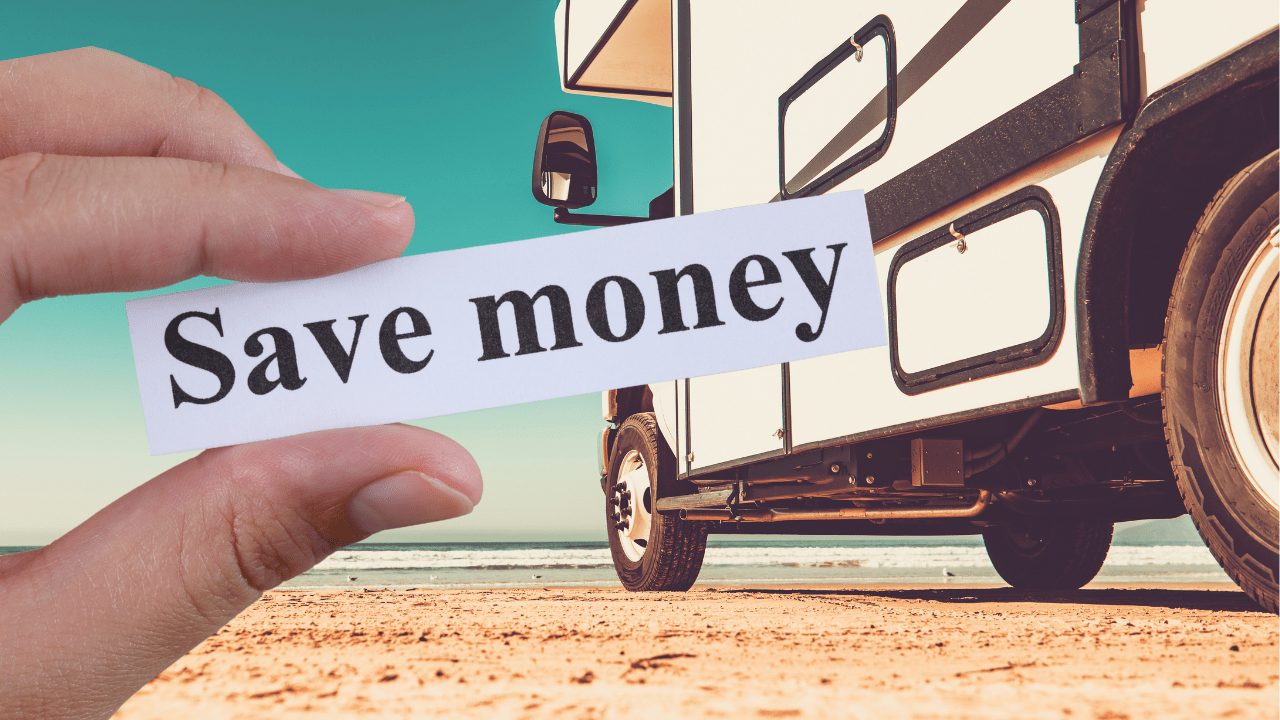
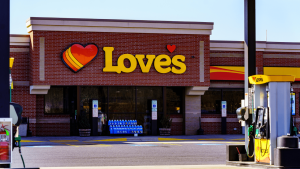

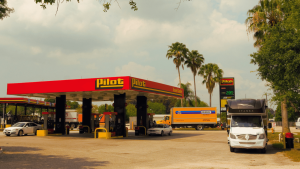

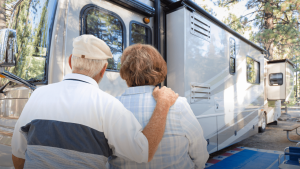
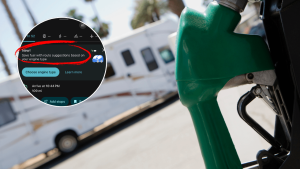
Write a comment